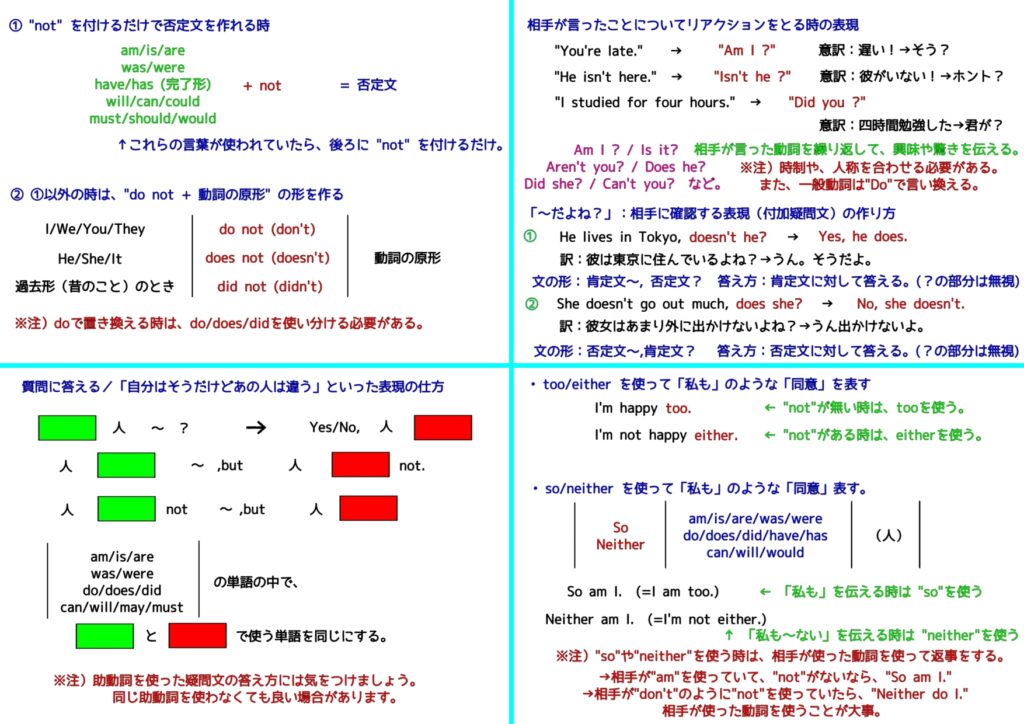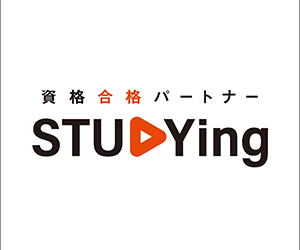第62回:繰り返しを避けるための「so」と「not」

同じ話を繰り返されると、聞かされる方も大変ですよね…
答えるときも、同じことを繰り返すのではなく、「so」や「not」を使って、ちょっと工夫出来ると良いですね!
Q. この記事で、一番大事なことって何?
A. 大事なことを、1枚の画像にまとめました。

いちいちノートにまとめるのが面倒だという方、また、
ノートにまとめることが苦手だという方は、ご活用ください。

[広告]
確かな英語力は、日々の継続から。
その継続を後押しする、第二言語習得理論に基づいた
オンライン英語学習プログラムがあります。
英語を使う人のための、確実なスキルアップが望める
7日間の無料体験はこちらから!

So と Not の使用法と例
文や節の代わりに「so」を使用して形容詞、副詞、または全体の節を繰り返すことができます。また、思考や話に関連する動詞の後には、「so」を使用することがよくあります。否定文では、「not」または「not… so」を使用します。さらに、特定の動詞の後には「so」を使用せず、「not」を使用します。
1.「so」と「not」の使用
- 形容詞、副詞、または全体の節を繰り返す代わりに「so」を使用することができます。
- 例:「The workers were angry and they had every right to be so.」(= angry)
- 例:「Joe took the work seriously and Petra perhaps even more so.」(= took the work seriously)
- 例:「Usman’s giving us a lift. At least I presume so.」(= that he’s giving us a lift)
- 思考や話に関連する動詞の後には、しばしば「so」が使われます。
- 例:「’Is Lewis going back to Scotland to see his parents this summer?” “I’ve no idea, but I’d imagine so. He goes most years.’」
- 例:「I found it ridiculous, and said so. /…and told them so.」(= that I found it ridiculous)
- 「tell」の後には間接目的語を含めます。
- また、以下の動詞の後には「so」を使用しません
:accept, admit, agree, be certain, hear, know, promise, suggest, be sure。 - ただし、非公式な英語では、特に議論の中で「I know so」を使用することがあります。
2.否定文での使用
- 否定文では、「not」または「not… so」を使用します。
- 例:「Is the Socialist Party offering anything new in its statement? It would appear not.」
- 例:「They want to buy the house, although they didn’t say so directly.」
- appear, seem, supposeの後には「not」または「not… so」を使用することができます。
- 例:「’I don’t suppose there’ll be any seats left.’ ‘No, I don’t suppose so.’」(または「I suppose not」)
- believe, expect, imagine, thinkの後には「not… so」を使用することが好まれます。これらの動詞では「not」がやや形式的です。
- 例:「’Will we need to show our passports?’ ‘I don’t think so.’」(「I think not」よりも「I don’t think so」が一般的)
- be afraid (regretの意味で), assume, guess (フレーズ’I guess…’, ‘I think…’で), hope, presume, suspectの後には「not」を使用します。
- 例:「’You’d better do it yourself. Eva won’t help.’ ‘No, I guess not.’」(not No, I don’t guess so.)
- sayの場合、not (to) と not… so の使い方を比較します。
- 例:「’Do we have to do all ten questions?’ ‘The teacher said not.’」(= the teacher said that we didn’t have to)
- 例:「’Do we have to do all ten questions?’ ‘The teacher didn’t say so.’」(= the teacher didn’t say that we should do all ten, but perhaps we should)
3.短い回答での使用
- 「so」を使用して、短い回答に「Yes,…」の代わりを提供することがあります。特に驚いた場合、何かが真実であることを伝えたい場合に使用します。
- このような回答では、so + 代名詞 + 助動詞(be、canなど)のパターンを使用します。
- 例:「’Lisa and Sara are here.’ ‘So they are.’」(または Yes, they are.)(= I can now see that, too)
- ただし、すでに何かを知っている場合は、「Yes,…」を使用します。
- 例:「’Your bike’s been moved.’ ‘Yes, it has. Philip borrowed it this morning.’」(= I knew before you told me)
- 例:「’Your bike’s been moved.’ ‘So it has. / Yes, it has. I wonder who did it.’」(= I didn’t know before you told me)
4.動詞と組み合わせた短い回答での使用
- appear (after ‘it’)、believe、gather、hear、say、seem、tell(例:So she tells me.)、understandなどの動詞でも同様に短い回答で「so」を使用することができます。ただし、これらの動詞では、「I knew before you told me」を意味するパターンとなります。
- 例:「’I found that lecture really boring.’ ‘So I gather (= I knew that). I saw you sleeping.’」
まとめ:
「so」と「not」は、文や節を繰り返さずに代わりに使用される表現です。また、否定文では「not」または「not… so」を使用します。特定の動詞の後では「so」を使用せずに「not」を使用します。さらに、短い回答で「so」を使用して驚きを表現することができます。これらの表現を適切に使い分けることが重要です。
具体例
- We can use so instead of repeating an adjective, adverb, or a whole clause:
- “The weather was terrible, and it made me cancel my plans. The others felt the same, so they also decided to stay home.” (The others felt the same way as I did.)
- “She worked hard to complete the project on time, and she succeeded in doing so.” (She succeeded in completing the project on time.)
- “Did they enjoy the concert?” “Yes, they definitely did so.” (Yes, they definitely enjoyed the concert.)
- We often use so instead of a clause after verbs concerned with thinking and speaking:
- “Do you think they will win the game?” “I believe so. They have a strong team.” (I believe that they will win the game.)
- “Will she be at the meeting?” “I expect so. She usually attends all the meetings.” (I expect that she will be at the meeting.)
- “Did you tell him about the party?” “Yes, I informed him so.” (I informed him about the party.)
- In negative sentences, we use not or not… so:
- “Is the package going to arrive today?” “It would appear not.” (It seems that the package will not arrive today.)
- “Are they planning to travel this summer?” “They didn’t say so directly.” (They didn’t directly say that they are planning to travel.)
- We can use so in a short answer, instead of a short answer with ‘Yes,…’:
- “Did you finish the report?” “So I did.” (Yes, I did. I can now confirm that I finished the report.)
- “Are they coming to the party?” “So they are.” (Yes, they are. I can now see that they are coming.)
- We can use so in short answers with verbs such as appear, believe, gather, hear, say, seem, tell, understand:
- “Did she say anything about the new project?” “So she tells me.” (Yes, she told me something about the new project.)
- “Are they leaving tomorrow?” “So I gather.” (Yes, that’s what I understand or have gathered.)
[広告]
TOEICのスコアを上げたいけれど、
まとまった勉強時間が取れなくて困っている…
なら、細かいスキマの時間を使いながら、
少しずつスキルを積み重ねてみてはどうでしょう。
スマホ1つでスコアアップが出来る、
オンライン講座のリンクはこちらから。

Q. この文法はどうやって使うのでしょうか?
A. 今回の文法を活用した会話文を見てみましょう。

Did you hear about the new job opening at the company?
(会社の新しい求人のことを聞いた?)

I’m not sure. I think I heard something about it, but I can’t remember the details.
(よく覚えてないけど、何か聞いたことはあるかも。詳細は思い出せないなぁ。)

Well, I believe they are looking for someone with experience in marketing.
(マーケティングの経験を持った人を探しているらしいよ。)

Ah, I see. So they want someone with marketing skills.
(ああ、そういうことか。マーケティングのスキルが必要なんだね。)

Yes, exactly. They mentioned it in their job posting.
(そう、まさにその通り。求人広告に書いてあったんだ。)

Oh, I didn’t read the posting, but I presume they mentioned the required qualifications.
(あら、その広告を読んでなかったけど、必要な資格についても書いてあったのかな。)

Yes, they did. They mentioned it quite clearly.
(そうだよ。はっきりと書かれていたよ。)

That’s good to know. I hope I meet the requirements.
(それは良かった。資格要件に合っていることを願いたいね。)

I’m sure you will. You have a lot of relevant experience.
(絶対大丈夫だよ。あなたは関連のある経験をたくさん持っているから。)

Thank you for saying so. I really appreciate your confidence in me.
(そう言ってくれてありがとう。)
[広告]
ロゼッタストーン・ラーニングセンターで、最先端の教育制度を活用して英語を学びませんか?私たちは個々の学習ペースに合わせてeラーニングと対面教育を組み合わせ、柔軟な学習環境を提供しています。自宅でのeラーニングと対面教育のメリットを最大限に活かし、あなたの英語学習をサポートします。最新のテクノロジーと個別の指導が組み合わさった当センターで、自由な学習スタイルを体験してみませんか?英語学習を楽しく効果的に進めるための環境がここにあります。新たな一歩を踏み出して、新しい英語学習の旅に参加しましょう!

Q. この記事の要点は?
A. 「so」・「not」を活用する方法を確認しました。
- soは形容詞や副詞、または節を繰り返さずに使用することができます。
- 考えたり話したりに関連する動詞の後には、節の代わりにsoをよく使用します。
- 否定文では、notまたはnot… soを使用します。
- 短い回答で、’Yes, …’の代わりに意外感を表す場合にsoを使用します。
- appear(’it’の後)、believe、gather、hear、say、seem、tell(例:So she tells me.)、understandの短い回答でもsoを同様に使用できます。ただし、これらの動詞の場合、パターンは「あなたが教えてくれる前に私は知っていた」という意味を含みます。
英会話を始めてみたいけれど、どのサービスが良いか分からない…
そんな方は、まず、この記事で3つのサービスを比べてみてはいかがでしょうか?
英語力を効率良く伸ばすことができるサービス3選です。

次回の文法解説は?
「Do so」と「such」を使って、繰り返しを避ける。
この記事を作る際に参考にした文法の解説書になります。
すべて英語で書かれていますが、練習問題が付いてます。
イギリス英語なので、スペル等の表記が異なる部分もありますが、
「使い方を練習したい」「繰り返し問題を解きたい」
という方は、使ってみても良いかもしれません。

関連記事一覧
他の文法解説記事を検索できます。






-320x180.jpg)





コメント